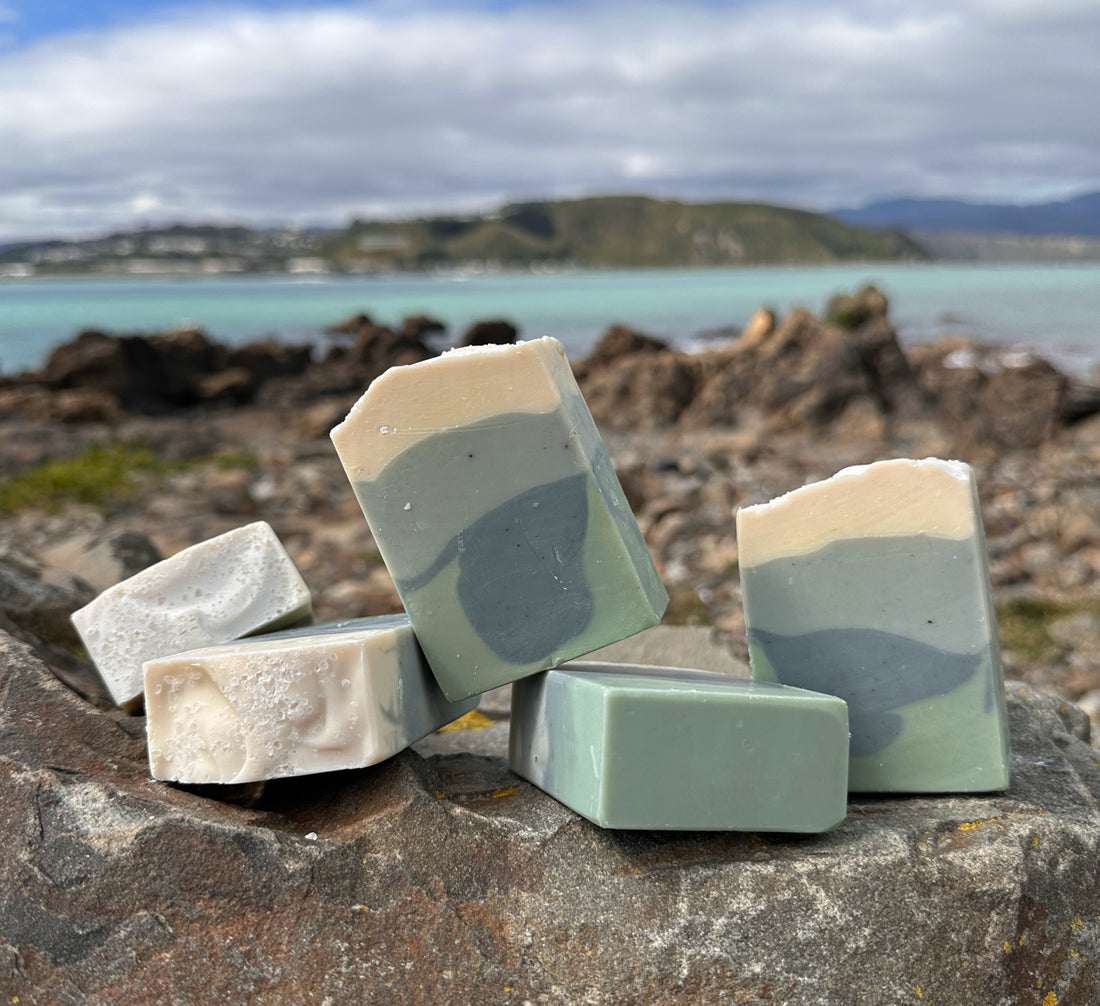
Why I've completely changed my soap recipe and what it means for Oh Goodness
Share
Not just greenwashing - truly sustainable soap?
As the last few years have unfolded, so too has our understanding of the climate emergency we now collectively face. Late last year, listening to the news, I started thinking about the ways in which I was contributing to this crisis. How could I create a truly sustainable bar of soap, one that went further than just plastic free packaging?
So I've developed a new soap recipe that is 100% locally sourced oils from NZ and the Pacific, vs my old recipe which is 100% oils sourced overseas. As I learnt more and adapted to the crisis unfolding around me, I decided that a flexible approach and more locally sourced ingredients felt right for my business. My soap is now about as sustainable as I can ever hope it to be. And that means it's not plant based any more.
Only the best ingredients
I've always tried to be very careful selecting ingredients for Oh Goodness products. My vision has always been to use ingredients good for both bodies and the planet. I've never used palm oil because of the environmental concerns surrounding its use, and I’ve made a few tweaks as I've gone along, such as swapping out almond oil in favour of apricot kernel.
When I began learning soapmaking, the recipes around the internet were mostly plant based, and when I began formulating my own, I created plant based recipes too, making sure the ingredients were fair trade, and ethically sourced. Definitely no palm oil!
History of soapmaking
To understand the ingredients soapmakers choose, it’s first necessary to understand a little about the history of soap. Soap, technically, is a salt of a fatty acid and we use this in a variety of cleansing and lubricating products. The kind of soap I make is known as toilet soap. To make it, we combine oils (triglycerides) and lye together in a process called saponification. Its history spans back to Babylonian times, around 2800 BC when a crude slurry of fats and ashes created cleansing properties. Though its accuracy is debatable, the name soap comes from an ancient Roman legend about Mount Sapo (which does't actually exist, by why let truth stand in the way of a good story!), when the animal fat used for sacrifice atop the mountain washed down the river, mixing with the ash from the fires forming cleansing parts in the river.
Throughout the centuries, soap has been made in one form or another using any type of fat available, and mostly people used what they had readily and plentifully available. The Italians, for example, had lots of olive oil so they created the first Castille soaps, made with 100% olive oil. Animal farmers used tallow, lard, or other rendered fats they had to hand.
Detergents were created in the early 20th century as the world wars saw shortages in fats both animal and vegetable so synthetic surfactants were invented to replace traditional soap making methods. Many of the "soaps" you buy at a supermarket are actually detergents. A resurgence of interest in “natural” soapmaking in recent times has seen a return to crafting a more traditional product, using lye, albeit a very sophisticated version of the original.
Soapmaking in today’s global world
As the availability of ingredients globally has increased and the desire for particular attributes has grown, makers have turned to a wider variety of oils all bringing different benefits to the finished product. Coconut oil is widely used for its unique bubble making abilities, but it is highly cleansing, meaning it can dry the skin. Other oils, such as avocado, sunflower and olive provide more moisturising properties. Castor oil can bring stability to the lather. Hardness comes from oils and butters which are harder at room temperature and contain more saturated fat. And so on. And thus a soapmaker will build a recipe based on cost, availability and their own preference. Palm oil is widely used to build a vegetable based bar as it’s cheap and hardens nicely. But what with its dubious environmental track record, I was reluctant to use it, so I turned to formulations with cocoa and shea butter for hardening (I use both in my vegetable recipe).
Plant based…but is it sustainable?
But what about the carbon footprint of such a bar? Even without the ethical concerns of cocoa butter on the humans who grow and harvest it, both these butters have to be shipped from far away around the world. No two ways about it, the carbon footprint is pretty big.
My recipe just wasn’t measuring up.
So I wondered, how could I achieve sustainability in a New Zealand context? New Zealand is blessed with an abundance of oils, couldn't I source my ingredients closer to home? Castile bars (100% olive) are lovely, with a beautiful creamy lather and produce a reasonably hard, durable bar. But it has to cure for a minimum of twelve months in order to attain the correct properties of lather and lose the gooeyness it otherwise has in an under-cured state. A “regular” bar of soap needs only 4-6 weeks to cure, which is much more manageable in terms of order and supply. Castile is also something of an acquired taste, and some of its properties make it hard to design with.
Soy wax was another option to consider and does make lovely hard creamy soap, but on further investigation soy farming has almost as dubious a history as palm oil. Further, It would always come from overseas, and mostly be genetically modified.
An upcycled byproduct
I started investigating animal fats in 2022. Soap makers I was in touch with in forums from all over the globe raved about their tallow and lard soaps. Tallow (the rendered and purified fat from beef trimmings) has been used for centuries for soap and candle making as well as many other things you probably wouldn't even think of. It is a byproduct in plentiful supply in New Zealand thanks to our cattle farming industry. Though it’s true that there are environmental concerns surrounding the production of meat and it comes with its own carbon footprint, tallow is a byproduct of this industry, a waste product if you consider the animal is killed for its meat, not its fat. Why not upcycle this into another product and make the best possible use of this animal? That made sense to me.
So I started experimenting. And it was a real eye opener. I could produce a beautiful, creamy bar of soap with a fine lather that didn’t turn to mush in the shower. It has a neutral smell, as saponification is an intensely reactive process that dramatically neutralises the smell of the original ingredients, so they’re often unrecognisable in their original form. The high saturated fat content of tallow moisturises beautifully and maintains a hardness you just can’t achieve without palm oil or cocoa butter in a vegetable bar.
What about the other ingredients?
So that was the hardening part of my bar sorted, but what about the rest? I love sunflower oil in soap, so I figured if I could find a NZ supplier then I would be able to up the ante on the NZ sourced component. I was very happy to discover the Good Oil company not only provides rapeseed, but also a beautiful, fresh, cold pressed sunflower oil grown in Canterbury.
Avocado is another favourite, in plentiful supply in NZ, however it’s pricey. I have managed to source a wholesale supply of refined avocado oil at a more reasonable price via the Avocado Grove in the Bay of Plenty.
Olive oil, though grown plentifully in NZ, tends to be of the boutique variety and most soapmakers go for a cheaper oil from overseas (those miles again) or use pomace oil (solvent extracted from the pulp after the first pressing) again coming mainly from overseas. So this was a conundrum; either pay a premium price or put up with the shipping miles. After asking around a few places, I found the Olive Press, a Wairarapa based operation who offer pressing services to olive growers. They could sell me a cheaper grade of oil at a reasonable price, essentially the oil cleared out of the presses at the end of each pressing, which isn't really suitable for eating, but perfect for soap. They also live in Wellington so I collect it periodically by driving across town, and for 45% of the makeup of my bar, has a satisfyingly short distance to travel over the hill to me.
Though coconut oil is absolutely not a NZ based product, it is a fairly crucial addition for bubbles. I source mine from Pure Coco, who source coconut oil ethically and sustainably from our pacific neighbours in Fiji, and who also work with and support communities there.
A sustainable solution for the future
After much soapy experimenting I'm finally happy with my base recipe. It lathers beautifully and has a wonderful creamy texture. I've always had high standards for my products, and these soaps more than measure up.
I try where I can to source essential oils for scent from NZ also - such as lavender oil from a farm in the Wairarapa, however many essential oils are simply not produced here. Clays and other additives are also often from overseas, but again where I can, I'm shopping local, trying to keep those miles down and support other local businesses, celebrating the abundance of our wonderful country.
A non vegetable based bar may be a turn off for some. There could be concerns around using soap containing animal products for vegetarians, or those concerned with animal welfare ( though be assured that NZ has some of the highest animal welfare standards in the world.) I get it, it won’t be for everyone. But working towards more sustainable solutions means, I believe, we have to start thinking more flexibly. For those willing to give it a go, I know you’ll be impressed by this soap. And it comes with some pretty swanky eco credentials too.

2 comments
Fascinating. Maybe there is a market for aged soap, like gourmet cheese?
Nga mihi nui Ana for sharing your journey in developing a sustainable soap. I have actively avoided animal products in soap for decades but because of your thorough research and connection with local providers I am now questioning the reasons why. Your focus on sustainability has made me think about what I value most and your new soap is the more ethical choice for me.